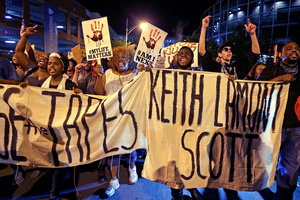
s he marched in protest through Charlotte shortly before the 2016 presidential election, Theodore Smith could not shake a strange suspicion that a foreign force was stalking his city.
What had begun as a heartfelt popular response to the police shooting of a local black man was taking on an unfamiliar hateful edge that felt inauthentic. On the internet, he saw protest campaigns that seemed to be no more than mash-ups of images designed simply to stir instinctive emotions.
“I wasn’t the only one thinking, ‘This doesn’t seem like our community,’” says Mr. Smith, a dreadlocked warehouse worker who recalls seeing pages such as “Black Matters US” popping up on his phone screen. “It felt purposefully manipulated.”










